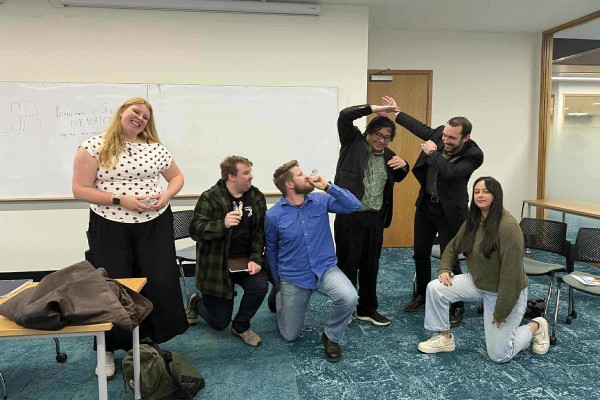Should Scarfie culture be officially recognised as intangible cultural heritage? Three Greens politicians, Mickey Treadwell, Francisco Hernandez and Rosie Finnie, think yes. But in a debate hosted by the Otago Politics Students Association (POLSA) at the Business School on Friday September 19, three students argued no – and won.
First up was mayoral candidate Mickey Treadwell. Addressing the modest crowd of about 12, Mickey outlined what Scarfie culture is. The term originated in the ‘60s, referring to the blue and yellow scarves that students wore to rugby games, and was popularised by the movie Scarfies (1999).
The Scarfie era has been considered the “golden age” of student culture at the University of Otago. To the modern student, it’s a term that’s probably only been used by parents sending down birthday beanies. Mickey blamed “material conditions” for eroding this culture: financial pressures under neoliberalism from increased tertiary fees, rising rental costs, and the cost of living crisis serving as an individualistic distraction.
Beyond advocating for the protection of Scarfie cultural heritage, Mickey has a plan to address these conditions that have “shunned students out of public life”. The mayoral hopeful identified the need to bring down the cost of living that’s seen two-minute noodles become a staple pantry item; improve housing conditions through a rental warrant of fitness; support engagement with culture and arts through subsidising a student bar; ramp up local support for rugby games; and introduce a universal student allowance. “We need to use all the tools in the kete, but recognising the culture is the first one,” he concluded.
Master of Politics student Molly Smith-Soppet was next up as first speaker of the negating team. She began by quoting an excerpt from a poem James K. Baxter wrote during Scarfie times – “Dunedin nights are often cold…” – and which the neg team believed represented “bygone times” (unsure if a shivering Critic agreed). “Intangible cultural heritage is about living practices, traditions, and expressions that communities identify with and want to pass on to future generations,” she said. “It’s about value, pride, and sustainability. And let’s be honest, my friends – Scarfie culture falls far short.”
Having been a student for four years, Molly has never identified with the term ‘Scarfie’. “It’s outdated, exclusive, and harmful,” she explained. The list went on in aspects that are conveniently left out of the romanticised version of Scarfiedom: a scene dominated by white men, destructive behaviours (fires, vandalism, couch burning), and binge drinking to excess. The next two speakers of her team, Postgrad Rep Josh Stewart and Sociology Masters student Will Henderson-Biss, somewhat negated their binge-drinking point when both dropped a knee and sank a shooter of vodka before speaking.
Drawing from her experience as a student, Molly argued that neither herself or her peers thought any good remnants of the Scarfie era remained. Students are now stuck with a strict surveillance of North Dunedin, a terrible reputation, and a “shitty movie that got far too much recognition considering it only has a 58% on Rotten Tomatoes” (oof). “It doesn’t represent today’s diverse student body,” said Molly. “To preserve it would be to glorify negative stereotypes that even Otago University has spent years trying to move away from [...] [and] freeze a caricature of the past instead of celebrating the culture we actually live in now.”
Greens MP Francisco Hernandez as the third speaker for the affirmative clarified that they agreed Scarfie culture was gone and wouldn’t like to see a return of exclusionary practices. However, they were arguing for a “broader definition” to encompass a culture where students could have a collective identity they once enjoyed. Bringing it back to political decision-making, Fran argued that the individualistic landscape of today is the result of the whittling away of Government-funded scaffolding that had once underpinned the student experience. “Belonging to something bigger than yourself is something that should survive,” he said.
To sum up, while the Scarfie culture of old is gone, the creation of a new, inclusive one that celebrates students and ensures their needs are met (including a student bar) is a must. Adjudicator from the Debating Society Liam Gould decreed that the negating team had presented a better way forward for a collective student identity, one that they argued is already on the right path. In the words of Will as he wrapped up, “Scarfie is dead. Long live the breatha."







